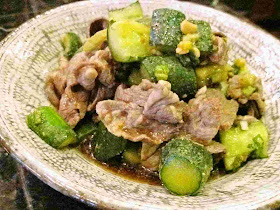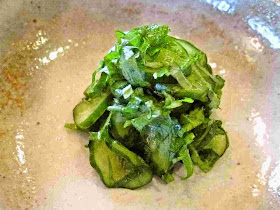Sections
▼
2011-09-30
Breakfast, September 27, 2011
2011-09-26
2011-09-25
2011-09-24
2011-09-22
Nasu no shiomomi / instant eggplant pickles
2011-09-21
Shirataki to jako no itameni / konnyaku noodles and young dried sardines in soy sauce broth
2011-09-19
Sumeshi / sushi rice
With only a couple of extra steps, you can make sushi rice the way it should be.
Whole recipe:
With homemade sushizu:
(sushizu made with shiokoji salted rice malt): 1,168 calories; 19.0g protein; 3.0g fat; 259.0g carbohydrate; 257.0 g net carbs; 282mg sodium; 0 mg cholesterol; 2.0 g fiber
(sushizu made with kosher salt) 1,180 calories; 19.0 g protein; 3.0 g fat; 253.0 g carbohydrate; 251.0 g net carbs; 779 mg sodium; 0 mg cholesterol; 2.0 g fiber
With store-bought sushizu:
1,138 calories; 18.4 g protein; 2.7 g fat; 242.5 g carbohydrate; 241.0 g net carbs; 1,583 mg sodium; 0 mg cholesterol; 1.5 g fiber
Whole recipe:
With homemade sushizu:
(sushizu made with shiokoji salted rice malt): 1,168 calories; 19.0g protein; 3.0g fat; 259.0g carbohydrate; 257.0 g net carbs; 282mg sodium; 0 mg cholesterol; 2.0 g fiber
(sushizu made with kosher salt) 1,180 calories; 19.0 g protein; 3.0 g fat; 253.0 g carbohydrate; 251.0 g net carbs; 779 mg sodium; 0 mg cholesterol; 2.0 g fiber
With store-bought sushizu:
1,138 calories; 18.4 g protein; 2.7 g fat; 242.5 g carbohydrate; 241.0 g net carbs; 1,583 mg sodium; 0 mg cholesterol; 1.5 g fiber
Sushizu / sushi vinegar
Did you know sushi vinegar is easy to make?
Regular version whole recipe (with 6 tbsp rice vinegar, 2 tbsp sugar/erythritol, 1 tsp kosher salt):
134 calories; 0.2 g protein; 0 g fat; 30.7 g carbohydrate; 30.7 g net carbs; 1,120 mg sodium; 0 mg cholesterol; 0 g fiber
(When using erythritol) 41 calories; 0.2 g protein; 0 g fat; 30.7 g carbohydrate; 6.7 g net carbs; 1,120 mg sodium; 0 mg cholesterol; 0 g fiber
Reduced-sodium version whole recipe:
115 calories; 0.5 g protein; 0.1 g fat; 25.3 g carbohydrate; 25.2 g net carbs; 375 mg sodium; 0 mg cholesterol; 0.1 g fiber
(When using erythritol) 53 calories; 0.5 g protein; 0.1 g fat; 17.3 g carbohydrate; 9.2 g net carbs; 375 mg sodium; 0 mg cholesterol; 0.1 g fiber
134 calories; 0.2 g protein; 0 g fat; 30.7 g carbohydrate; 30.7 g net carbs; 1,120 mg sodium; 0 mg cholesterol; 0 g fiber
(When using erythritol) 41 calories; 0.2 g protein; 0 g fat; 30.7 g carbohydrate; 6.7 g net carbs; 1,120 mg sodium; 0 mg cholesterol; 0 g fiber
Reduced-sodium version whole recipe:
115 calories; 0.5 g protein; 0.1 g fat; 25.3 g carbohydrate; 25.2 g net carbs; 375 mg sodium; 0 mg cholesterol; 0.1 g fiber
(When using erythritol) 53 calories; 0.5 g protein; 0.1 g fat; 17.3 g carbohydrate; 9.2 g net carbs; 375 mg sodium; 0 mg cholesterol; 0.1 g fiber
Handai, hangiri sushi rice mixing tub
Typically made of Sawara Cypress (Chamaecyparis pisifera), the sushi rice mixing tub is lightweight, has no coating, and absorbs excess moisture while mixing sushi vinegar into steamed rice. Tubs or bowls made of other materials are OK, but handai/hangiri is well worth the investment to easily prepare sushi rice with just the right of moisture without rice becoming soggy or the surface being too sticky. Some handai/hangiri come with a lid of the same material, yet lid-less design is more common. To cover sushi rice in handai/hangiri, a moistened (well-wrung) towel works just fine (and is better than non-wood hard materials).
Comes in various sizes according the amount of rice or the number of servings.
To prevent rice from sticking, handai/hangiri is first moistened before use. Just like with other shiraki (uncoated wood) products, handai/hangiri needs to be dried well before storing to prevent mold. If not used for an extensive period of time, wetting and drying it monthly is recommended. Moisture absorption, retention and breathing are shiraki products' functions in practical usage, and oil is not used in their care.
2011-09-18
Tamagoyaki / plain omelet
2011-09-15
Tamagoyaki-ki / square omelet pan
The curved-up bottom at the far end helps to roll egg mixture into an oblong cylinder form. While it is not a must-have item to cook tamagoyaki or usuyakitamago, the majority of households in Japan probably have at least one in their kitchen.
Comes in various sizes according to number of servings.
Size of the pan matters when making the stumpy oblong shape, which is typically how tamagoyaki is served. When the pan is too big for the number of servings, tamagoyaki would be too thin.
Suigyoza wrappers / shuijiao boiled dumpling wrappers
Supple and smooth wrappers for suigyoza, shuijiao boiled dumplings.
Whole recipe (40 wrappers):
769 calories; 18.8 g protein; 3.8 g fat; 156.3 g carbohydrate; 150.4 g net carbs; 4 mg sodium; 0 mg cholesterol; 5.9 g fiber
Each wrapper:
19 calories; 0.5 g protein; 0.1 g fat; 3.9 g carbohydrate; 3.8 g net carbs; 0.1 mg sodium; 0 mg cholesterol; 0.1 g fiber
769 calories; 18.8 g protein; 3.8 g fat; 156.3 g carbohydrate; 150.4 g net carbs; 4 mg sodium; 0 mg cholesterol; 5.9 g fiber
Each wrapper:
19 calories; 0.5 g protein; 0.1 g fat; 3.9 g carbohydrate; 3.8 g net carbs; 0.1 mg sodium; 0 mg cholesterol; 0.1 g fiber
2011-09-13
Shiso perilla leaves, flowers and fruits
Shiso perilla leaves are largely either green or purple, with some leaves being flat and some crinkled. There are also bicolor shiso leaves with a green top surface and purple underside, as shown with katamenjiso below.
Aojiso Perilla frutescens crispa fo. viridi-crispa
Akajiso Perilla frutescens purpurea Makino (flat leaves) and Perilla frutescens purpurea crispa (crinkled leaves)
Katamenjiso Perilla frutescens crispa fo. discolor
Where I grew up, shiso is synonymous with aojiso or oba [both green perilla], but when it comes to umeboshi pickled plums, shiso always means akajiso [purple perilla]. In some regions, shiso is said to be more strongly associated with akajiso [purple perilla]. Confusing, isn't it? Aka literally means red, therefore it refers to the reddish purple color. Ao, referring to the green leaves, literally means blue in today's Japanese language, but in ancient times it referred to cold colors (both greenish and bluish) in general. For this reason, the actual color of something described as ao [blue] is often green.
Aojiso Perilla frutescens crispa fo. viridi-crispa
Akajiso Perilla frutescens purpurea Makino (flat leaves) and Perilla frutescens purpurea crispa (crinkled leaves)
Katamenjiso Perilla frutescens crispa fo. discolor
Kyuri Japanese cucumber
Cucumis sativus
2011-09-12
Kyuri to atsuage no pirikaraae / Japanese cucumber and deep-fried tofu with ginger and spicy soy sauce
Juicy, crispy, and substantial. Ginger stimulates the appetite in hot weather.
109 calories (1/2 of recipe); 7.6 g protein; 7.3 g fat; 2.6 g carbohydrate; 1.6 g net carbs; 155 mg sodium (with 50% reduced-sodium soy sauce; 235 mg with regular soy sauce); 0 mg cholesterol; 1.0 g fiber
109 calories (1/2 of recipe); 7.6 g protein; 7.3 g fat; 2.6 g carbohydrate; 1.6 g net carbs; 155 mg sodium (with 50% reduced-sodium soy sauce; 235 mg with regular soy sauce); 0 mg cholesterol; 1.0 g fiber
Sakana to kinoko no tsutsumiyaki / fish and mushrooms grill-steamed in paper packet
Dinner, September 3, 2011
We found chanterelle mushrooms at our local farmers' market, the first time this season. We also bought some red rockfish. Fresh fish is tasty by itself and simple preparation works the best.
2011-09-05
Konnyaku
Konnyaku is jelly-like yam (Amorphophallus konjac) cake eaten for its texture rather than for its taste. Yet while this is true if you are eating inexpensive mass-manufactured konnyaku, fresh konnyaku made in the traditional method has a delicate flavor and it is well worth trying if you ever have an opportunity, such as at a morning market in the countryside of Japan. It will make you wonder about all those konnyaku you have been eating.
2011-09-04
Poo ob woon sen / steamed crab with mung bean noodles
A flavorful crab dish with the pungent punch of whiskey. Great with steamed rice or drinks!
1/2 of regular recipe:
309 calories per serving; 14.1 g protein; 13.9 g fat; 26.6 g carbohydrate; 25.4 g net carbs; 792 mg sodium; 24 mg cholesterol; 1.2 g fiber
1/2 of reduced-sodium version:
278 calories per serving; 14.0 g protein; 10.9 g fat; 26.7 g carbohydrate; 25.5 g net carbs; 558 mg sodium; 24 mg cholesterol; 1.2 g fiber
309 calories per serving; 14.1 g protein; 13.9 g fat; 26.6 g carbohydrate; 25.4 g net carbs; 792 mg sodium; 24 mg cholesterol; 1.2 g fiber
1/2 of reduced-sodium version:
278 calories per serving; 14.0 g protein; 10.9 g fat; 26.7 g carbohydrate; 25.5 g net carbs; 558 mg sodium; 24 mg cholesterol; 1.2 g fiber
2011-09-03
Ganmodoki / deep-fried tofu patties
Home-made ganmodoki tofu patties are heavenly soft and flavorful.
When 10 patties are made:
141 calories (1 ganmodoki); 8.1 g protein; 12.0 g fat; 4.7 g carbohydrate; 1.3 g net carbs; 29 mg sodium; 214 mg cholesterol; 3.4 g fiber
When 12 patties are made:
107 calories (1 ganmodoki); 6.8 g protein; 10.0 g fat; 3.9 g carbohydrate; 1.1 g net carbs; 24 mg sodium; 18 mg cholesterol; 2.8 g fiber
141 calories (1 ganmodoki); 8.1 g protein; 12.0 g fat; 4.7 g carbohydrate; 1.3 g net carbs; 29 mg sodium; 214 mg cholesterol; 3.4 g fiber
When 12 patties are made:
107 calories (1 ganmodoki); 6.8 g protein; 10.0 g fat; 3.9 g carbohydrate; 1.1 g net carbs; 24 mg sodium; 18 mg cholesterol; 2.8 g fiber
2011-09-02
Suribachi & surikogi / mortar & pestle
Suribachi pottery mortars are glazed outside and unglazed inside. A comb pattern on the inside surface works as a grinder when food is pressed against it with a hand or pestle. In addition to grinding ingredients, it is used to mash or mix. Suribachi come in various sizes according to type of food and the number of servings to prepare.
For the surikogi pestle, sansho (Zanthoxylum piperitum) is the traditional material (in photo). It is very hard wood and does not wear out easily. It is also said to neutralize harmful substances in food ingredients, but this claim is likely untrue since this effect comes from the skin of sansho fruit and not from the wood. The uneven surface of a sansho pestle naturally provides a good grip.
Nagaimo Chinese yam
Dioscorea batatas
Nagaimo is one of the top tonic-effect vegetables. When cut or skinned, nagaimo secretes a sticky fluid. The slimy fluid contains mucin and mannan that protect stomach mucus (preventing stomach ulcers), prevents diabetes and hyperlipidemia as well as revitalizes the immune systems.



































